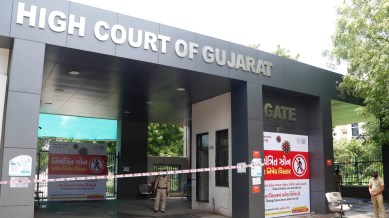Stay updated with the latest - Click here to follow us on Instagram
Gujarat High Court upholds constitutional validity of Anti-Land Grabbing Act, including provisions applied retrospectively
The Gujarat High Court also rejected the plea for an extension of stay on further proceedings on the FIRs lodged under the anti-Land Grabbing Act.

The Gujarat High Court on Thursday upheld the constitutional validity of the Gujarat Land Grabbing (Prohibition) Act, 2020, dismissing a bunch of over 100 petitions that had challenged the law.
The law came into effect in December 2020 and was first challenged before the high court in February 2021. The petitions challenging the constitutional validity of the Act were first heard by a division bench led by then Chief Justice Vikram Nath (now a Supreme Court judge). The case was subsequently taken up by a division bench led by the next Chief Justice Aravind Kumar, who is also an SC judge now.
monthly limit of free stories.
with an Express account.
Reading the operative portion of the verdict on Thursday, Chief Justice Sunita Agarwal and Justice Aniruddha Mayee held that they did not find any good ground to hold the law to be unconstitutional. They added that there was “no question of repugnancy to the central laws such as the Limitation Act, 1963; Civil Procedure Code (CPC), 1908; Criminal Procedure Code (CrPC), 1973; Transfer of Property Act, 1882; Specific Relief Act, 1963; Indian Evidence Act, 1872; and the Indian Contract Act, 1872,” as claimed by the petitioners.
Given that the Court did not find the Gujarat legislation to be in contradiction with the Union government’s legislations, the Court held that it “cannot be said to be hit by Article 254 of Constitution of India for want of presidential assent,” as was argued by the petitioners. Article 254 deals with inconsistency between laws made by Parliament and laws made by state legislatures.
The Court also held that the plea of manifest arbitrariness and the Act being violative of Article 14 of the Constitution by treating ‘unequals as equals’, too, does not hold. It then observed that the “various provisions of the Gujarat Land Grabbing (Prohibition) Act, 2020, are found to have rationale with the object and purpose of the Act which is to curb the land grabbing activities in Gujarat.”
Dismissing the petitions to be “devoid of merit”, the bench recorded that the Act cannot be said to be violative of the basic structure of the Constitution.
“Testing the validity of the Gujarat Land Grabbing (Prohibition) Act 2020 on the doctrine of proportionality for providing a minimum sentence of imprisonment of 10 years for the offence of land grabbing, it is concluded that the wisdom of the legislature is to be given due credence. It is for the legislature, the representative of people, to decide as to what is good and bad for them as it is supposed to know and be aware of the needs of the people. The Court cannot sit in judgment over its wisdom,” the Court held, thus concluding that the Act cannot be invalidated on the plea of the petitioners that the prescribed punishment is harsh, disproportionate, and manifestly arbitrary.
The Court also did not find any substance in the petitioners’ argument wherein they challenged the validity of the Act on the grounds of mens rea (the intention of committing an offence) and the retrospective application of the Act.
Comparing the Gujarat law with pari materia (similar statutes with similar objects and similar subject matter) – legislations enacted in other states such as Assam, Karnataka, and Andhra Pradesh, the Court held that “the validity of the pari materia provisions have been upheld by the Karnataka HC and Assam HC in the challenge to the enactment made by the state legislatures.”
Following the pronouncement of the verdict, advocate Megha Jani, appearing for some of the petitioners, requested that the interim relief granted by way of a stay on further proceedings on the FIRs lodged under the Act, be extended until July 30 since the Supreme Court shall reopen on July 8. The request was, however, rejected by the Court.